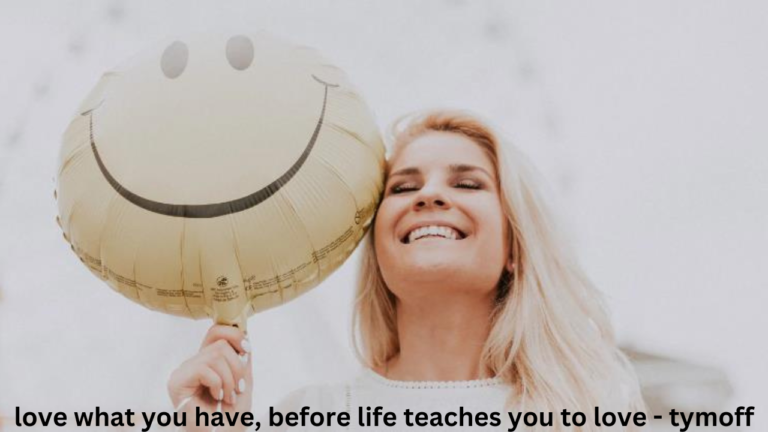Life is a precious journey, and the phrase “love what you have, before life teaches you to love – tymoff” is a poignant reminder to appreciate our blessings before circumstances force us to. This philosophy teaches us the value of gratitude, mindfulness, and contentment, offering a pathway to deeper happiness and fulfillment. In this article, we’ll explore how to embody this mindset in everyday life, from cherishing simple joys to cultivating strong relationships.
The Power of Gratitude
Gratitude is at the heart of loving what you have. It shifts our focus from what we lack to the abundance already present in our lives. Simple practices like keeping a gratitude journal can profoundly change our perspective. Start by listing three things you’re grateful for each day—this could be a warm meal, a supportive friend, or the beauty of nature.
By adopting a gratitude mindset, we train ourselves to notice and appreciate life’s everyday blessings. This approach aligns with the wisdom of “love what you have, before life teaches you to love – tymoff,” highlighting that true happiness often stems from appreciating what we already possess.
Finding Joy in Simple Moments
Life’s most profound joys often come from its simplest moments. A child’s laughter, a heartfelt conversation, or the warmth of the sun on your face can bring immense satisfaction when truly appreciated. Tymoff’s philosophy reminds us to pause, reflect, and immerse ourselves in these fleeting but meaningful experiences.
Instead of chasing material possessions or grand achievements, look inward and find joy in the present. This shift not only enhances our daily lives but also builds resilience against life’s inevitable ups and downs.
The Role of Mindfulness
Mindfulness is a powerful tool for loving what you have. It teaches us to live in the moment, free from regrets about the past or worries about the future. Mindfulness encourages us to savor life as it unfolds, whether it’s enjoying a meal without distractions or simply being present during a conversation.
By practicing mindfulness, we become more attuned to the beauty of our current circumstances. This practice embodies the spirit of “love what you have, before life teaches you to love – tymoff” and helps us stay grounded in gratitude.
Building Stronger Relationships
Our relationships are among the greatest treasures in life. Strengthening connections with loved ones not only deepens our sense of belonging but also reinforces the principles of gratitude and appreciation.
Take time to express your love and gratitude to the people who matter most. A simple “thank you” or a heartfelt note can go a long way in nurturing these bonds. Cherishing relationships is a key component of living by Tymoff’s wisdom.
Letting Go of the Pursuit of More
Modern society often equates success with acquiring more—more wealth, possessions, or accolades. However, this relentless pursuit can leave us feeling unfulfilled. Tymoff’s philosophy urges us to step back and recognize the treasures we already have.
Decluttering both physically and mentally can help. By letting go of unnecessary possessions and focusing on what truly matters, we create space for appreciation and joy. This simplicity is a cornerstone of loving what you have.
Gratitude During Challenging Times
Life is not without its hardships, and finding gratitude during these moments can be difficult. However, it’s often during challenges that Tymoff’s message resonates most. Even in adversity, there are aspects of life to be grateful for—a supportive friend, a lesson learned, or simply the strength to keep going.
Practicing gratitude during tough times builds resilience and helps us navigate life’s uncertainties with a positive outlook.
Practical Steps to Cultivate Gratitude
- Start a Gratitude Journal: Dedicate a few minutes each day to write about things you’re grateful for.
- Practice Mindful Breathing: Take moments throughout the day to focus on your breath and appreciate the present.
- Celebrate Small Wins: Acknowledge achievements, no matter how minor they seem.
- Declutter Your Space: Remove distractions to focus on what truly brings you joy.
- Express Appreciation: Regularly thank those who make your life better.
These steps align with the essence of “love what you have, before life teaches you to love – tymoff,” helping you build a life filled with gratitude and contentment.
FAQs
1. What does “love what you have, before life teaches you to love – tymoff” mean? This phrase encourages us to appreciate our current blessings before life’s challenges force us to realize their value.
2. How can I practice gratitude daily? Start with small actions like maintaining a gratitude journal, celebrating minor victories, or expressing thanks to others.
3. Is it wrong to want more in life? It’s natural to have ambitions, but balance is key. Gratitude ensures you find joy in the present while striving for future goals.
4. How does mindfulness help in loving what you have? Mindfulness keeps you grounded in the present, helping you appreciate life as it happens rather than focusing on what’s missing.
5. Can gratitude improve mental health? Yes, studies show that gratitude enhances mental well-being by reducing stress, improving relationships, and increasing overall happiness.
Conclusion
The message behind “love what you have, before life teaches you to love – tymoff” is a timeless lesson in gratitude, mindfulness, and finding contentment in the present. It calls us to appreciate the blessings we often take for granted, from our relationships to life’s simple joys, and to shift our focus from chasing more to cherishing what we already possess. By integrating practices like gratitude journaling, mindfulness, and celebrating small victories, we can create a life filled with deeper happiness and resilience, even in the face of challenges. This wisdom is a gentle reminder that true fulfillment begins with valuing what we have right now.


